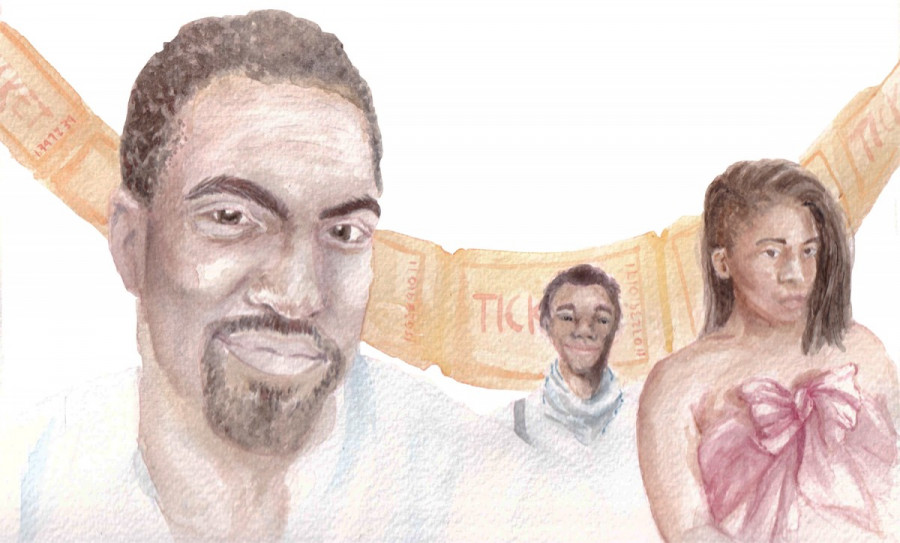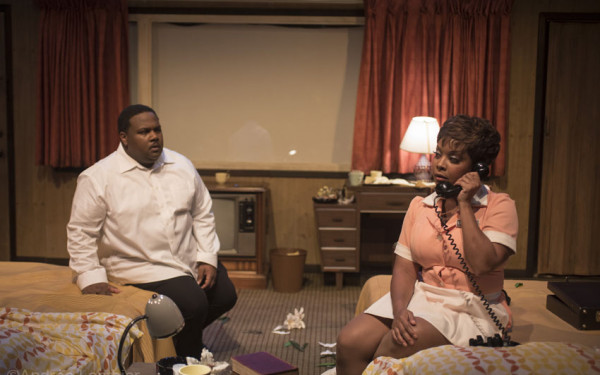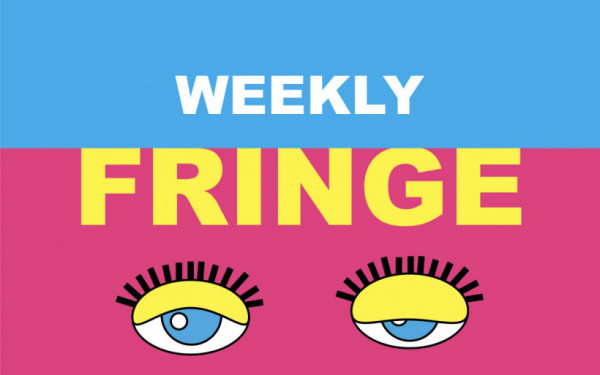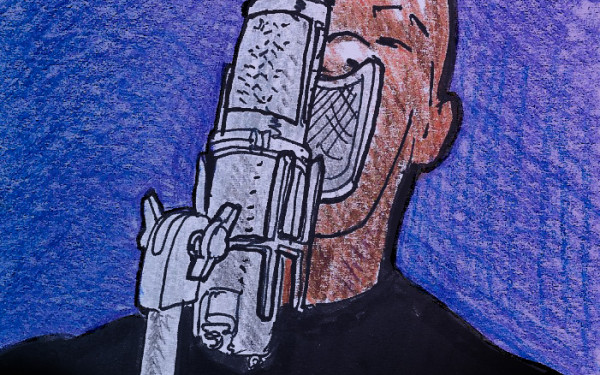Marginalized Stories Take Centre Stage At Black Theatre Workshop
Mentorship Program Fosters Opportunity and Inclusivity for Artists of Colour
As Canada’s oldest Black theatre company, the Black Theatre Workshop has long asserted itself as a Canadian art pioneer. This year marks its 47th season putting on productions that resonate with Black communities in the city.
“The reason that the company was even founded years ago was that those who started it felt that they weren’t seeing themselves on stage,” said artistic director Quincy Armorer. “You couldn’t go to the theatre as a Black person and say, ‘Hey there’s people that look like me!’ or see stories that you connect with.”
In the thriving theatre landscape of the country, BTW works to ensure that artists of colour are given the chance to participate in its development, and that Black Montrealers see their culture properly represented.
“It’s really to make sure that stories that speak to the experiences in our cultures, dreams, and aspirations are being told,” explained Armorer
“It was very grassroots in the beginning and for quite some time,” said Armorer.
At first, BTW didn’t have offices and meetings were held in people’s kitchens and basements. The organization was officially incorporated in 1972.
The first time Armorer worked with the BTW was in 1997. He has acted and directed in productions with the company, and would eventually become its artistic director in 2012.
“We’re seeing more diversity, which is fantastic. This province of ours, which I do love, has often created a lot of challenges and a lot of barriers,” said Armorer.
Armorer views BTW as an advocate for change, something they take very seriously. He thinks that theatre-going audiences are proving their desire for this kind of work. According to Armorer, BTW tells stories that do not get seen on mainstream stages today—let alone even 20 years ago.
BTW was nominated for 10 awards at the Montreal English Theatre Award Ceremony in 2016-2107, winning for production regarding the play Angélique. However, Armorer is most proud of their 2015-2016 award for Equality Diversity and Inclusion.
“We embrace all sectors of the Black community […] there are stories of the LGBTQ+ communites within that, and that’s really important,” said Armorer.
One of his goals as the artistic director has been to increase the amount of Black queer content they produce, beginning with this season’s Montreal premiere of Black Boys by Stephen Jackman-Torkoff, Tawiah Ben-Eben M’Carthy, Thomas Olajide, Virgilia Griffith, and Jonathan Seinen. Together they form the Saga Collectif.
Armorer saw the show in Toronto over a year ago, describing it as “fantastic,” and igniting his desire to see it performed in Montreal. He approached Saga Collectif about presenting it, then consulted with the artistic director of Espace Libre, a French-language art space, who was also impressed and agreed to host the production.
The play will tour across Canada, starting in Montreal on Feb. 13, followed by Calgary and then Vancouver. It will end in Toronto where it first premiered.
The production will run for a week in English, with French surtitles. Armorer said that they added French to attract people from both linguistic sides.
“The theatre communities in Montreal, the francophones and anglophones, they’re almost segregated, for lack of a better word,” explains Armorer.
What differentiates the theatre’s translations from those shown on TV is that they’ll be shown overhead of the playing space, making them surtitles rather than subtitles.
Armorer noted that this play has been unusual for BTW because it’s a collaboration between the Black and Francophone theatre communities for a show focusing on LGBTQ+ issues. “It’s fantastic to see it all coming together,” said Armorer.
Jackman-Torkoff said it was important for both parties to see more representation of Black queer stories.
According to Armorer, there are several things they put into consideration when choosing the plays that BTW will present. He mentions balance, in both gender and the level of experience artists bring as being important.
“Sometimes there is a false expectation that the shows we do need to be about race or racism,” said Armorer. “Why can’t we tell a story about family and it just happens to be a Black family, and it doesn’t necessarily have to be ‘bad bad white person!’”
“So that’s important to me, that we’re not ghettoizing our stories or sticking to long held stereotypes. A lot of the plays that are rooted in race are very serious and sometimes you just want to laugh. It’s about finding balances within the stories that are told,” he continued.
Armorer thinks it is important to bring content to a French audience. “There is a large French speaking Black population in Montreal and they’re essentially not being represented or served by theatre on the Francophone side,” he said.
“As a Black woman, and a Black woman anglophone actually, it’s not that I could never have opportunities as other people, it’s just 10 times harder. It’s just the reality of what it’s like to be a visible minority, anglophone, in Quebec.” — Nalo Soyini Bruce
Black Boys
Jackman-Torkoff is a performer, artist, and one third of the Black Boys creators. He describes himself as being very open, which is reflected in an artistic practice that’s never tethered to just one medium.
It was when he went to the National Theatre School in Montreal that he began working on Black Boys with his collaborators, in 2013, two days after graduation.
Jackman-Torkoff and the four other members of the SAGA collectif initially worked on it casually.
Part of the play’s material was based off the performers’ taped and transcribed conversations where they discussed their experiences as Black, queer men and the issues those communities face.
The experience of working with other artists of colour has been positive for Jackman-Torkoff. Having shared experiences allowed him to show more vulnerability to his collaborators.
“It can be hard to be the only one of colour and have an experience and not know how to share that,” he explained.
Jackman-Torkoff would rather call Black Boys an event or an experience, not a play. He explains that while it is a play in the technical sense of it being a timed performance, there is a lot more to it than just “visual language.”
“It’s a spiritual experience, and not just for the audience, but for us as performers. I would call it an activation ceremony, I want people to feel activated to do their own similar work and to break out of what we think we know of theatre and art and to push ourselves to go there,” said Jackman-Torkoff.
Each performance of Black Boys differs from the last. Jackman-Torkoff plays with his self and gender expression in the show by changing his costumes as the inspiration strikes.
“It’s a show of expressing our vulnerabilities in a way we have complete agency over,” he said.
Armorer and Jackman-Torkoff were aware of each other because of the latter’s participation in the artist’s mentorship program as a playwright.
Artist Mentorship Program
The Artist Mentorship Program is by and large the most relevant indication of BTW’s commitment to supporting local artists of colour.
First launched in 2012, the program is for emerging artists who specialize in different aspects of theatre: acting, directing, set or costume design, playwriting or stage managing.
The program in its current iteration evolved from the Youth Works program, created in 2002. “It was a little bit different before, almost like a summer camp,” said Armomer. He said that it was meant for 11 to 17-year-olds, happening on weekends and one intense week in the summer.
Now, it is held once a year, from October to April, and geared to artists who have some experience working professionally in their field but are looking to make more connections with others in theatre, hone their craft with the help of seasoned artists, and acquire the tools necessary to make a living off their art.“It can be daunting, just finishing theatre school and being dropped into the professional world not knowing what to do,” said Armomer.
Nalo Soyini Bruce, an artist in the 2017-2018 mentorship program, said she’s never encountered a program that provides such a high level of support for the artists.
“The experience is amazing. It’s a group of individuals who are serious about what they want to do, they’re working on a professional level,” she said. “It’s really a unique opportunity to network and just become close and become a family with a group of people [in the field].”
Kě Xīn Li is a Concordia communications student and artist in the 2017-2018 artist mentorship ensemble. They are in the playwriting section of the program.
“It’s helped me a lot as an artist,” said Li. “I don’t think there’s any other program quite like it.”
They’ve learned a lot about the theatre industry and networking, both of which are important for an emerging artist to know. “The program does a really good job as a mentorship program and at bridging the gap between the industry and working artists,” they said.
Artists in the program are paired with mentors with years of experience. The designers and stage managers often have the opportunity to assist them in their work, so Bruce is helping her mentor, Eo Sharp, prepare for The Baklawa Recipe, a production put on by Centaur Theatre.
“We get to go to production meetings, we get to assist where there’s the opportunity to do it,” she said. “So you really just get right into it and it’s really fun.”
Armorer explains that interest in the program has grown to the point where they’re now accepting 14 applicants, instead of 12.
The program’s weekly meetups consist of group discussions and workshops. Some workshops are meant for the whole group and cover general aspects of working as an artist. Others are tailored to specific fields.
“We even do grant workshops […] And they’re really relevant to working as a professional,” said Bruce. She said they had a workshop about taxes coming up soon. “We’ll be very much ready, pen and paper, lots of coffee,” she laughed.
Artists in the program are also provided with tickets to theatre productions going on in the city. “Regardless of where you are financially, you’ll still get the opportunity to see the shows that are happening in the city, so that’s great,” said Bruce.
Being accepted also means receiving an honorarium for seventh months, provided by the Department of Canadian Heritage.
The program ends with a showcase featuring work collaborative work between the artists.
Armorer explains that while the program gives priority to Black artists and people of colour, the colour of your skin isn’t a requirement for acceptance.
“As a Black artist personally, and as a company that exists because there was nothing for us, I know what it’s like to have doors closed before you, and I want to be an open door,” said Armorer.
Being in an environment with other people of colour has been a supportive and empowering experience for Li. They’ve struggled with the feeling of wanting to be acknowledged by a white audience but it’s helped them realize they don’t need the validation of “straight white people” and that writing aimed at queer people of colour is just as valuable.
Bruce believes that it’s BTW’s continuous commitment to telling the stories of marginalized communities and promoting artists of colour that sets it apart from other Canadian companies.
“A lot of theatres […], it’s in their mandate to be open but it’s not always obvious that it’s something that is a real commitment. And I feel that at the Black Theatre Workshop, it is actually open to everyone,” she said.
“As a Black woman, and a Black woman anglophone actually, it’s not that I could never have opportunities as other people, it’s just 10 times harder. And that’s not a fault of my own, it’s just harder. It’s just the reality of what it’s like to be a visible minority, anglophone, in Quebec. I’m always seen as other, outsider.”
She said that the artist mentorship program is one place where those setbacks are truly nonexistent.
“For all these years [they] have been working to be sure that those hurdles are not in place when someone goes to work with them,” she said. “This mentorship program, these are not hurdles that you have to face, and I think that’s amazing.”
“As time goes on you almost hope that the need for a company like Black Theatre Workshop would almost diminish,” said Armorer.
“With every passing year it’s almost more important for this company to exist and thrive. I think it’s more important now than ever.”







